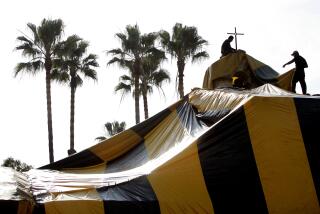Meet the beetle: Asian pest a threat to California’s avocado crop
[Updated at 6 p.m. May 11 with comment from the California Avocado Commission and 2011 crop value.]
A tiny Asian beetle could spell big trouble for California’s avocado industry.
The insect, known as the tea shot hole borer, has been found on backyard avocado trees in several Southern California communities, where it’s spreading a fungus that’s scarring tree bark and causing branches to shrivel and die.
The plant ailment, known as “Fusarium dieback,” was identified recently by UC Riverside extension plant pathologist Akif Eskalen. He said that since February, the disease has been spotted in more than a half-dozen locations in Los Angeles County, including South Gate, Long Beach and Whittier.
It’s not clear how the beetle, Euwallacea fornicatus, which is native to Sri Lanka, India and other parts of South Asia, arrived in Southern California. But other imported pests have arrived on shipping crates or in plants smuggled in by travelers.
California’s commercial avocado groves so far have been spared. But the state’s growers are concerned enough that the California Avocado Commission has provided Eskalen’s team with $100,000 in emergency funds to get a handle on the scope of the infestation.
“The challenge with the beetle is that it lives right inside the tree,” said Jonathan Dixon, research program director at the commission. “There is very little you can do about it.”
California produces more than 90% of U.S.-grown avocados. Last year’s crop was valued at $460 million, Dixon said.
Eskalen said California’s industry has good reason to be worried. Tea shot hole borers travel fast — they can easily fly 500 yards at a stretch. And Fusarium dieback already has wreaked havoc on avocado groves in Israel, where scientists have yet to find a predator or poison to neutralize the beetle.
“It’s a serious threat,” Eskalen said. “There is no cure.”
California is already battling the Asian citrus psyllid, which spreads a disease that is threatening the state’s $2-billion citrus industry.
The tea shot hole borer is an ambrosia beetle about the size of a sesame seed. It carries the Fusarium fungus in its mouth. When the beetle burrows into an avocado tree, it infects the plant with the fungus. Fusarium then attacks the tree’s vascular tissue, interrupting the flow of water and nutrients.
Telltale signs of an infestation include dead or dying branches, as well as beetle exit holes on the bark of the tree’s trunk or main branches. The wood near these exit holes may be discolored, wet-looking or be coated with a white, powdery substance.
Eskalen encourages anyone who suspects an avocado tree is infected to contact him at (951) 827-3499 or by email at aeskalen@ucr.edu.
RELATED:California braces for a deadly stalker of citrus
Citrus disease spurs quarantine in Hacienda Heights






